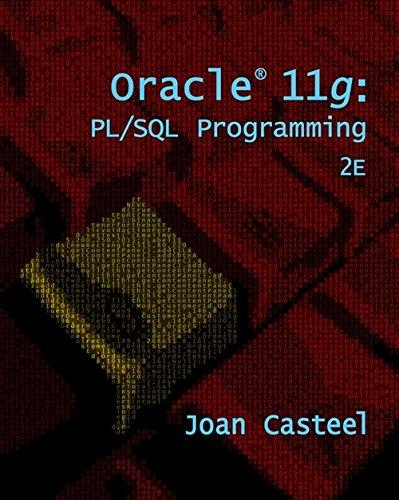Question
Copy non-comment lines from one file to another: Files sometimes use a special initial character, like #, to indicate comments; this is common in Unix/Linux
Copy non-comment lines from one file to another:
Files sometimes use a special initial character, like #, to indicate comments; this is common in Unix/Linux shell scripts
Windows command files use the colon character, :
Write a program CopySkip, similar to CopyFile, that copies lines from an input file to an output file, but only those that do not begin with a specified character.
CopySkip takes three command line arguments, the input file name, the output file name, and the character, e.g.: java CopySkip in.txt out.txt "#"
Remember that args is a String array, so the character comes in as a String
Enclose the comment character in single or double quotes in the program call as shown above
Copy CopyFileMethod.java to CopySkip.java and change the copyFile method to be: public static void copySkip(String inFile, String outFile, char skip) Adjust the logic in this method so that lines starting with character skip are not written to the output file, and then call that method inmain to actually do the copying; be sure to pass in the first character of args[2] to be the parameter skip, that is, extract that character from the String args[2]
Your program will be tested by sending in sample files to copy that contain no comments to skip, some comments to skip, and all comments to skip; the test version of main will print the input file, copy the file using copySkip, and then print the output file to show that no comment lines were copied
If you want to test your program, the available input files for testing are nocomments.txt, somecomments.txt, and allcomments.txt - all of them use the '#' character to skip, and somecomments.txt also has lines that begin with the ':' character to skip, so you can try both
import java.io.*;
public class CopySkip { /* using IO methods, write a printFile method that prints the lines of a file */ public static void printFile(String fileName) { /* copy this method from CopyFileMethod here */ } /* using IO methods, write a copySkip method that copies one file to another but does not copy lines that begin with the third parameter's character skip; the output file must not exist, otherwise this method prints an error message */ public static void copySkip(String inFile, String outFile, char skip) { /* first copy the copyFile method body from your CopyFileMethod program here; as you process each line from the input file preparing to write it out, check if the input line is empty (.equals("")) - if so, just write it out, because it cannot begin with the skip character; if the input line is not empty, check to see if it's first character matches the skip character, and if so, do not write that line to the output file (skip it) */ } public static void main(String[] args) // uses program command line arguments { if (args.length != 2) { // change this to test for args.length != 3 System.out.println("Usage: CopyFile inputFile outputFile"); // change this to say CopySkip and add the skip character at the end of the printout System.exit(0); } /* Note: the available input files for testing are nocomments.txt, somecomments.txt, and allcomments.txt - all of them use the '#' character to skip, and somecomments.txt also has lines that begin with the ':' character to skip, so you can try both */ /* DO NOT MODIFY THE REST OF THIS MAIN METHOD, WHICH WILL BE USED FOR TESTING */ System.out.println("input file lines from " + args[0] + ":"); printFile(args[0]); System.out.println(); copySkip(args[0], args[1], args[2].charAt(0)); System.out.println("file lines after copying to " + args[1] + ":"); printFile(args[1]); } }
Step by Step Solution
There are 3 Steps involved in it
Step: 1

Get Instant Access to Expert-Tailored Solutions
See step-by-step solutions with expert insights and AI powered tools for academic success
Step: 2

Step: 3

Ace Your Homework with AI
Get the answers you need in no time with our AI-driven, step-by-step assistance
Get Started


